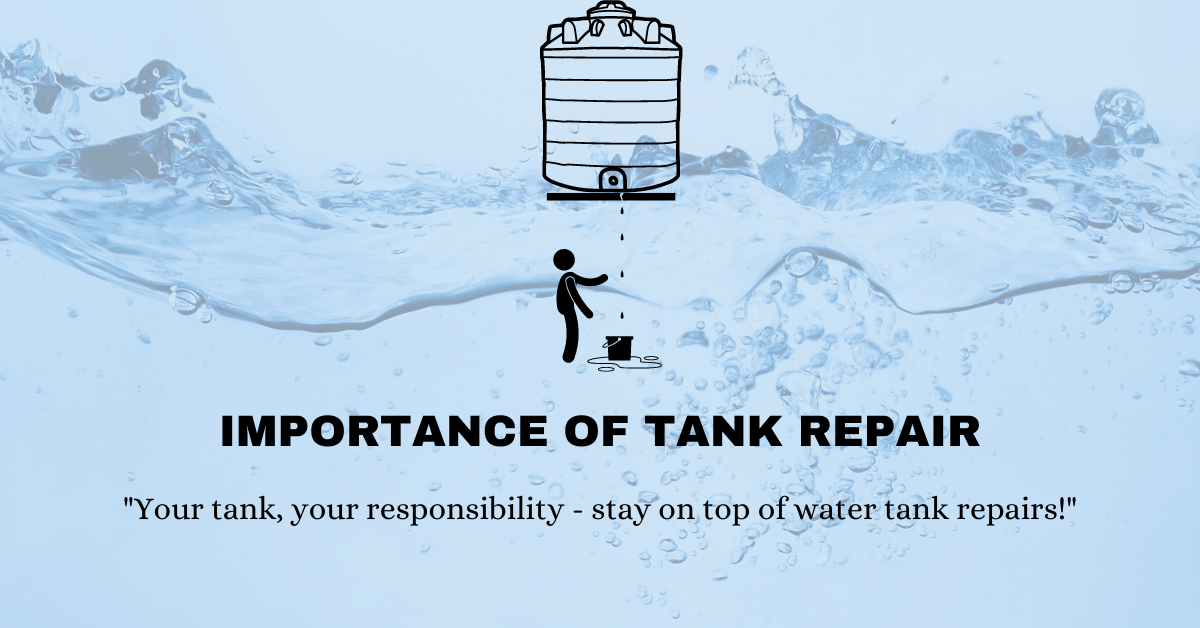Are you dealing with a leaking water tank? Don’t let it go unchecked! A water tank repair may be necessary to ensure the safety and longevity of your tank. In this article, we’ll explore the importance of repairing water tanks and how to go about it.
is water tank repair necessary?
Yes, it is necessary to repair a water tank when there is a significant amount of water wasted. Water tanks can develop various problems over time, such as cracks, leaks, and blockages. If these problems are left unaddressed, they can cause a significant waste of water over time. It can be very costly, and it can harm the environment as well. The repair of the water tank can help to prevent further waste of water and can also help to ensure that the water tank is operating at its full capacity so that no water is wasted. As a result, there can be a reduction in water bills and maintenance of a healthy environment. In addition, repairing any water tank issues can also help prolong its life and ensure that it is functioning optimally.
What is the life span of water tank ?
The lifespan of a water tank depends on the type of tank and the environment in which it is stored. It is generally the case that plastic tanks last between 10 and 15 years, and steel tanks last up to 25 years. In addition, tanks that are properly maintained and are not exposed to extreme temperatures will last longer if they are properly maintained.
What are the common problem with water tank ?
- Leaks: Water tanks can leak due to poor installation, rust, corrosion, or other factors that can cause leaks.
- Contamination: It is possible to acquire contamination of a water tank from sediment and other particles within the water, or outside sources, such as animals and plants, for example.
- Algae Growth: Algae can grow in water tanks due to poor maintenance, warm temperatures, and inadequate filtration.
- Corrosion: Corrosion can occur due to various factors, including a high level of acidity in the water, improper material selection, and incorrect installation.
- Poor insulation: Poor insulation can lead to the water in a tank becoming too hot or too cold, damaging the tank.
when should a water tank be replaced?
A water tank should be replaced when it has deteriorated to the point that it cannot be repaired, is leaking, or has reached the end of its expected lifespan. Generally, water tanks should be replaced every 20-35 years.
how long does a metal water tank last?
The life expectancy of a metal water tank depends on the type of metal and the environment it is in. In general, stainless steel tanks have a life expectancy of up to 50 years, while galvanized steel tanks have a life expectancy of up to 10 years. Other metals, such as aluminum, may have shorter lifespans.
Does water tank affect water pressure?
Yes, water tanks can affect water pressure. When a water tank is filled with water, it increases the water system’s pressure. When water is used from the tank, the pressure drops. The size and shape of the tank, along with the height of the tank, can also affect the pressure of the water system.
how often should you service a water tank?
It depends on your type of water tank and your water quality, but generally, a water tank should be serviced and inspected at least once a year. Some tanks may require more frequent servicing, especially if they are located in places where the water quality is poor or if they are located in areas that are prone to corrosion due to their location. It depends on your type of water tank and your water quality, but generally, a water tank should be serviced and inspected at least once a year. Some tanks may require more frequent servicing, especially if they are located in places where the water quality is poor or if they are located in areas that are prone to corrosion due to their location.
Which is better metal or plastic water tank?
It depends on your specific needs. Metal water tanks are typically more expensive and durable than plastic tanks, while plastic tanks are usually cheaper and easier to install. Metal tanks also have the advantage of being able to withstand higher water pressure
is water tank repair necessary?
Yes, it is necessary to repair a water tank when there is a significant amount of water wasted. Water tanks can develop various problems over time, such as cracks, leaks, and blockages. If these problems are left unaddressed, they can cause a significant waste of water over time. It can be very costly, and it can harm the environment as well. The repair of the water tank can help to prevent further waste of water and can also help to ensure that the water tank is operating at its full capacity so that no water is wasted. As a result, there can be a reduction in water bills and maintenance of a healthy environment. In addition, repairing any water tank issues can also help prolong its life and ensure that it is functioning optimally.
What is the life span of water tank ?
The lifespan of a water tank depends on the type of tank and the environment in which it is stored. It is generally the case that plastic tanks last between 10 and 15 years, and steel tanks last up to 25 years. In addition, tanks that are properly maintained and are not exposed to extreme temperatures will last longer if they are properly maintained.
What are the common problem with water tank ?
- Leaks: Water tanks can leak due to poor installation, rust, corrosion, or other factors that can cause leaks.
- Contamination: It is possible to acquire contamination of a water tank from sediment and other particles within the water, or outside sources, such as animals and plants, for example.
- Algae Growth: Algae can grow in water tanks due to poor maintenance, warm temperatures, and inadequate filtration.
- Corrosion: Corrosion can occur due to various factors, including a high level of acidity in the water, improper material selection, and incorrect installation.
- Poor insulation: Poor insulation can lead to the water in a tank becoming too hot or too cold, damaging the tank.
when should a water tank be replaced?
A water tank should be replaced when it has deteriorated to the point that it cannot be repaired, is leaking, or has reached the end of its expected lifespan. Generally, water tanks should be replaced every 20-35 years.
how long does a metal water tank last?
The life expectancy of a metal water tank depends on the type of metal and the environment it is in. In general, stainless steel tanks have a life expectancy of up to 50 years, while galvanized steel tanks have a life expectancy of up to 10 years. Other metals, such as aluminum, may have shorter lifespans.
Does water tank affect water pressure?
Yes, water tanks can affect water pressure. When a water tank is filled with water, it increases the water system’s pressure. When water is used from the tank, the pressure drops. The size and shape of the tank, along with the height of the tank, can also affect the pressure of the water system.
how often should you service a water tank?
It depends on your type of water tank and your water quality, but generally, a water tank should be serviced and inspected at least once a year. Some tanks may require more frequent servicing, especially if they are located in places where the water quality is poor or if they are located in areas that are prone to corrosion due to their location. It depends on your type of water tank and your water quality, but generally, a water tank should be serviced and inspected at least once a year. Some tanks may require more frequent servicing, especially if they are located in places where the water quality is poor or if they are located in areas that are prone to corrosion due to their location.
Which is better metal or plastic water tank?
It depends on your specific needs. Metal water tanks are typically more expensive and durable than plastic tanks, while plastic tanks are usually cheaper and easier to install. Metal tanks also have the advantage of being able to withstand higher water pressure







